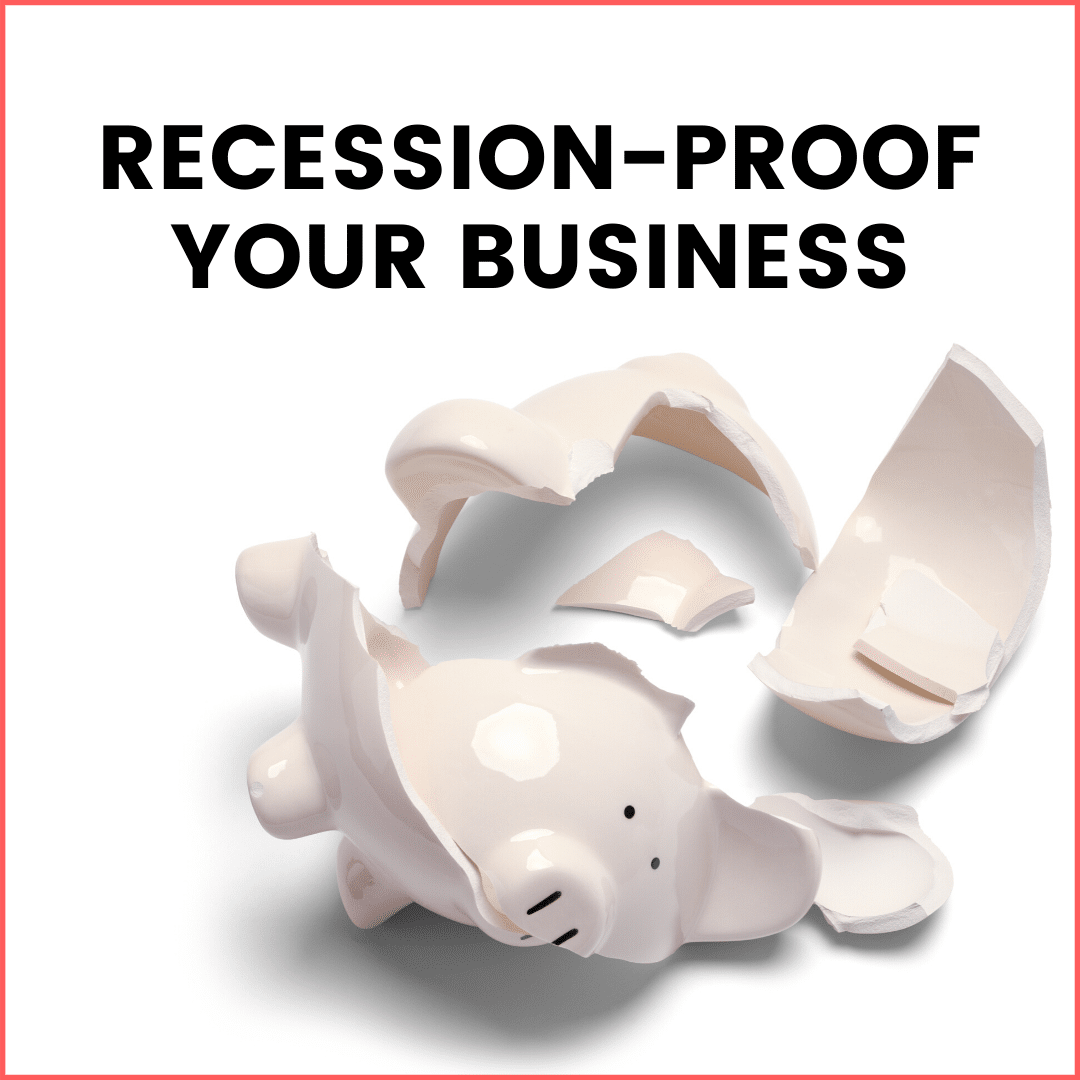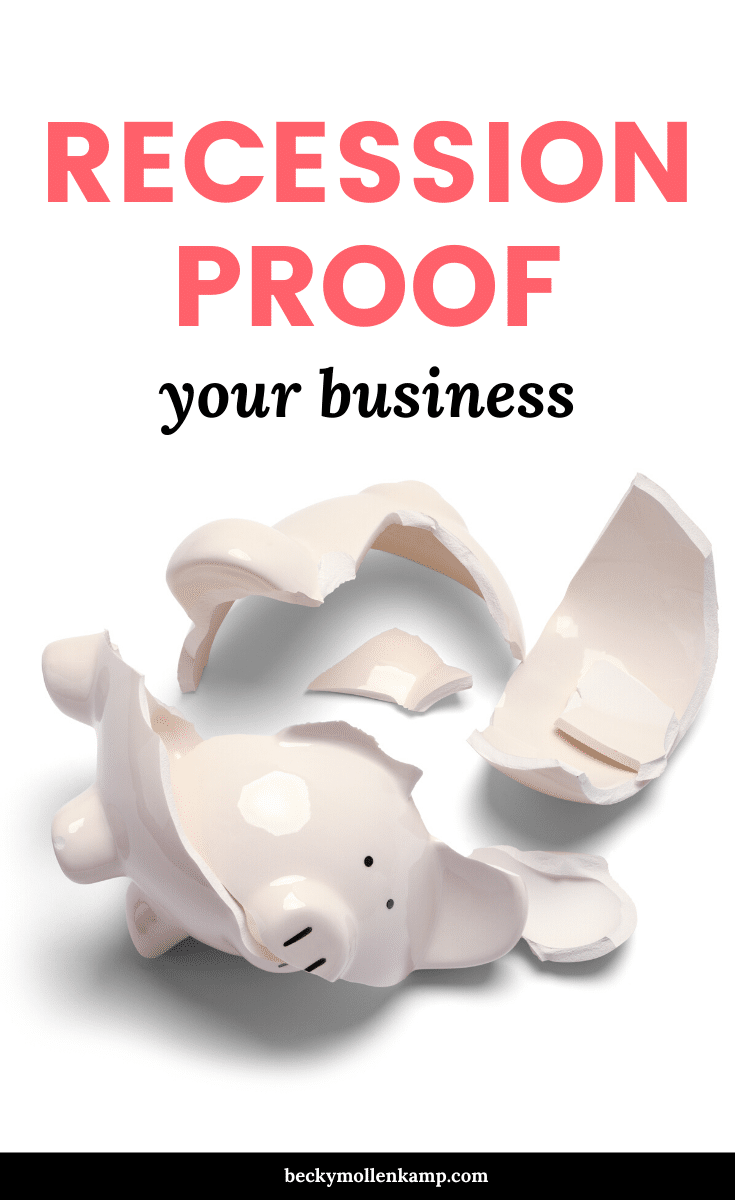As I write this, the world is in the grips of Coronavirus, also called COVID-19. The economy is shaky, and running a business feels scary. Your business can survive recession—or even have success in recession—if you learn how to manage a downturn (and do some recession planning for next time).
I started my own business in 2005 during a strong economy. Then came the Great Recession of 2008. I was completely unprepared. In 2008, I made $110,000. In 2009, I didn’t even clear $14,000.
At the same time, I was dealing with the deaths of my grandmother and brother, a divorce, and losing my home—all in six months. It was A LOT. Not a pandemic, but certainly an upended of my life as I knew it.
I learned a lot about how to run a business during a recession (and what not to do). So, this is my 5-step recession survival guide for other small business owners facing such tough circumstances for the first time.
1. Feel your feelings
Whether it’s a global pandemic or a routine economic slump, any major change can be traumatic. It can also trigger unresolved trauma from childhood or adulthood, which only compounds the feelings.
Allow yourself the space to feel what comes up. Don’t beat yourself up or do what you “should.” It’s okay not to push or be super productive or be grateful for this time.
Don’t surround yourself with people who tell you to “get over it” “work harder” or not let your “scarcity mindset” or fears get the best of you. Your feelings are real. Your fears are real. Your situation is real. Honor it and yourself. Do what you need to to protect yourself and your family.
2. Ask for help
Asking for help is hard for so many of us, especially for women who tend to be cast int the role of care giver, putting everyone else’s needs ahead of their own. But not asking for help when times are tough is a recipe for disaster. It’s the surest way to burn out and fall farther behind.
Find community wherever you can: Attend networking events, if possible. Have as many virtual coffee chats as you can. Start a mastermind with a trusted group of peers. Talk to other business owners who get what you’re experiencing.
Thanks to this story we tell ourselves, we don’t talk to anyone about our fears because we worry it would be admitting “failure” and looking like a fraud. That’s a lonely and scary place to be. Take a risk and be vulnerable enough to tell others who “get it” about the hard times and your fears. You’ll likely hear a chorus of “me too,” and that support network can also help you devise a plan to turn things around.
If you need help learning how to ask for what you want and need, sign up for my free Gutsy Ask Email Challenge. You’ll get a bunch of mindset and practical tips for confidently making asks that are met with yes.
3. Act like a CEO
I went far too long treating my business like a hobby, even though it was my full-time job and I made a full-time living. Recession taught me that it’s vital to act like a CEO, even if you’re a business of one.
If you haven’t already, set up an LLC and get an EIN from the IRS (to use instead of your SSN). Also, separate your business and personal finances with different bank accounts.
Taking those actions can provide legal protection. If ever you’re sued (perhaps you default on a loan, break a contract, etc.), your personal assets are in jeopardy if you’ve not clearly established your business as a separate entity.
Also, getting serious about your business finances is perhaps the most important thing you can do to prepare for bad times. Switching to the Profit First accounting method is keeping my business alive during the current downturn. It allowed me finally clearly see where every dollar I earn goes.
Thanks to Profit First, I have enough money to pay my business expenses for months, to pay my taxes on time, and a rainy-day fund just for my business to continue to pay myself even when revenue is down or dead.
Finally, track your data. No CEO of a big company would be making decisions without hard numbers in front of them—and neither should you.
It’s easy to spiral from “I’m not making enough money right now” to “I’m a loser.” This is particularly true when we rely only on our bank account and our feelings to assess our success.
The cure is to track more metrics in your business so you can use factual data to assess your progress. Sales may be down, but perhaps you’re growing your email list or appearing on more podcasts—or any number of other things that might later result in sales. Revenues may be down, but perhaps your actual profits are up, or you are getting more repeat clients.
Knowing *all* of your numbers will paint a more complete picture of the ways you’re growing and improving, even if actual sales are down.
You can also use this data to help with the feast-famine cycle of business. If year after year, work slows down every holiday or every summer, you can be better prepared for them, financially and emotionally.
4. Keep planting seeds
A slow time, especially one we didn’t choose, is very scary. It’s also an ideal time to plant seeds that will later help your business grow.
During an economic downturn, resist the urge to let panic stop you from taking action. Instead, use this time to play the long game with marketing efforts that will pay off in the future, including:
- Write content that you can bank and use when you are busy again
- Optimize content that already exists (improve blog post SEO, upgrade your courses or opt ins)
- Launch a podcast, YouTube channel, or Facebook group
- Create new pins for existing content, join more group boards, and share like crazy on Pinterest
- Have as many virtual coffee chats as you can
- Emails current and past customers, and prospects, to ask for new business, referrals, or just to stay top of mind
- Learn new skills by attending events, taking courses, and reading books
A slower time is also an opportunity to do big-picture thinking and planning. How might you need to pivot business to respond to the changing economy? What changes to pricing, offers, messaging do you want to make? How can you improve what you do to boost customer loyalty? What could you do to promote referrals?
You should be having a CEO Day at least once a quarter, and a recession is no time to put it on the back burner. Sit down with pen and paper and start dreaming and plotting. You can grab my 20+ page CEO Day workbook for just $10 to guide these efforts.
5. Don’t make big decisions
Don’t make big decisions on your worst (or your best) day. Those decisions are based on feelings, not facts. They are rooted in the story you’re telling yourself, and one that will very likely change.
Feelings aren’t facts!
Take a break and, when you feel more even keeled, analyze the facts before doing something rash like changing your business model or quitting.
It’s easy to panic during a recession. But also, there is so much that is outside of our control.
That’s why it’s also really important to develop some healthy mindset practices to help you weather the storm. Here’s a mindset practice that I use (and teach my coaching clients) that has saved me from diving off the deep end many times.
At least once a day, find 5-10 minutes of quiet to ask yourself three questions:
- What am I feeling? What issues are coming up for me right now? Where am I feeling resentment, frustration, fear? On what thoughts do I keep spinning?
- What are the facts? What do I know to be true? It’s amazing how often when I ask my clients about facts that they start citing feelings and beliefs, not facts. I’ll end up homeless is not a fact. My bank account is at $100 is a fact.
- What’s my choice here? Here’s the hard truth: You only have control over your reactions. You can’t control circumstances like coronavirus, and you can’t control others. You can only control how you react to those things. So, what choice are you going to make?
This mindset practice is designed to take you from reactionary to proactive.
If you need more help quieting the mind and avoiding limiting beliefs, you can learn about my mindset coaching practice here.



